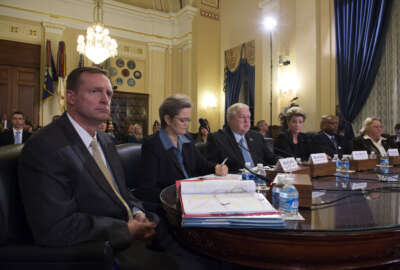
VA looks to Congress for PR help as it remedies agency’s ‘culture of fear’
One congressman and the Veterans Affairs Department's number two both suggested the VA doesn't need another policy or rule to help the agency turn around years of...
As the Veterans Affairs Department looks to turn around years of mismanagement and bad PR, one congressman suggested the VA doesn’t need another policy or rule to help it hold its senior executives accountable.
Maybe it just needs more conscientious leaders.
“What you need is an ethical compass and more responsibility to care for our veterans,” Rep. Tim Walz (D-Minn.) said during a Senate Homeland Security and Governmental Affairs Committee field hearing in Tomah, Wisconsin, May 31. “We’re starting to get there. What we’re hearing … is what can we do to ensure that the public believes that — believes that we’re not protecting bad employees, believes we’re not protecting and giving rights that no one else in society would have for bad employees to continue to draw a paycheck?”
The discussion came as committee Chairman Ron Johnson (R-Wis.) released a 359-page report detailing his investigation into years of mismanagement problems at the Tomah Veterans Affairs Medical Center.
According to Johnson’s report, Tomah leaders generally ignored years of warning signs and two separate whistleblower disclosures, which raised concerns that medical center managers allowed doctors to over-prescribe medication to some veterans.
The VA has since fired the Tomah Medical Center director and other health professionals the department found guilty of providing poor care to its veteran patients.
But the committee wanted to know what the VA is doing now to improve a “culture of fear” that has since plagued the Tomah Medical Center and other facilities across the country.
Deputy VA Secretary Sloan Gibson was frank: it was the department’s leadership that allowed situations like those in Tomah to continue.
“This is about delivering safe care to veterans and the failure of leadership that happened here was the failure on the part of the medical center director to take appropriate action,” Gibson said. “I mentioned earlier, I issued the removal of the medical center director. I reviewed hundreds and hundreds of pages of evidence. Not doing something about this would be very consistent of the pattern of behavior that I saw there. It was a failure of leadership. It should not have happened. Period. And I don’t need a policy or a rule to try to enforce that. We’re back to principles.”
Getting VA leaders to actively embrace and act on those principles while considering employee morale and satisfaction — their due process rights — is the biggest challenge the department now faces, Gibson said.
Related Stories
“We don’t need a watchdog to tell us how to do our job,” he added. “[It’s] important to have a good watchdog. But we don’t need one to tell us how to do our job.”
But Gibson acknowledged that new proposals like those included in the Veterans First Act, which would change the way the VA Secretary hires, appraises and disciplines medical professionals under Title 38, is perhaps the most helpful move Congress can make on behalf of the department.
Gibson said he and VA Secretary Bob McDonald have met with 600 of the department’s top managers to teach and encourage them to take a more proactive leadership approach.
“This is a 180 degree change for this organization,” Gibson said. “First of all, folks weren’t talking to members of Congress or to the media under any circumstance. What we’re trying to do is to get them to talk, both when there’s good news or bad news. Bad news [doesn’t] keep. So if you have bad news, let’s get it out on the table, own the problem, start tackling it and get it fixed. That’s how you earn trust back.”
Tuesday’s hearing also marked the first time Michael Missal, the VA’s new inspector general, appeared publicly to testify before a congressional committee after the Senate confirmed his nomination in April to be the department’s permanent IG.
The VA had previously been without a permanent inspector general for about a year and a half.
“My office has learned important lessons from the Tomah healthcare inspections that should help us better meet our mission going forward,” Missal said in his testimony. “The changes that we have made should increase the confidence that veterans, veterans service organizations, Congress and the American public have in the OIG.”
Copyright © 2025 Federal News Network. All rights reserved. This website is not intended for users located within the European Economic Area.
Nicole Ogrysko is a reporter for Federal News Network focusing on the federal workforce and federal pay and benefits.
Follow @nogryskoWFED





